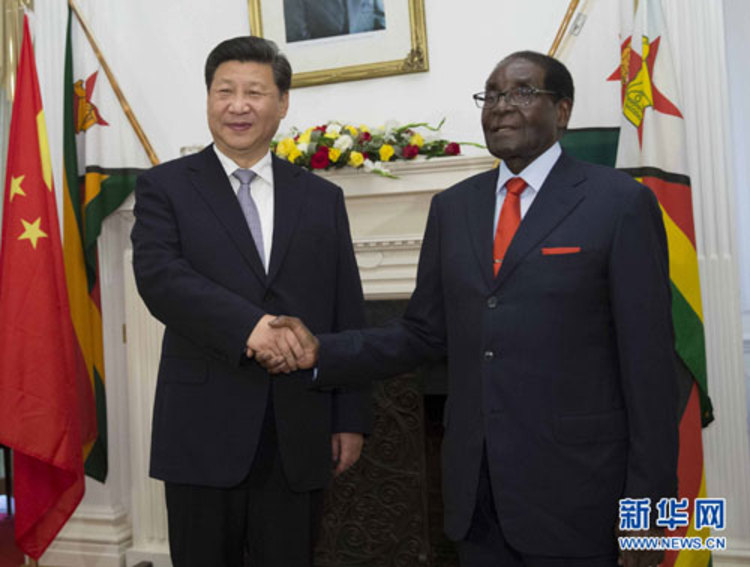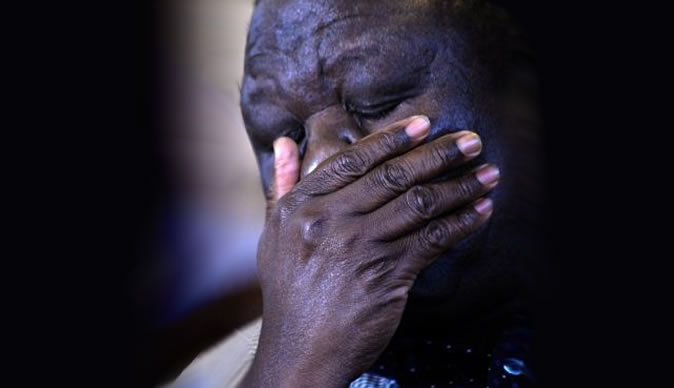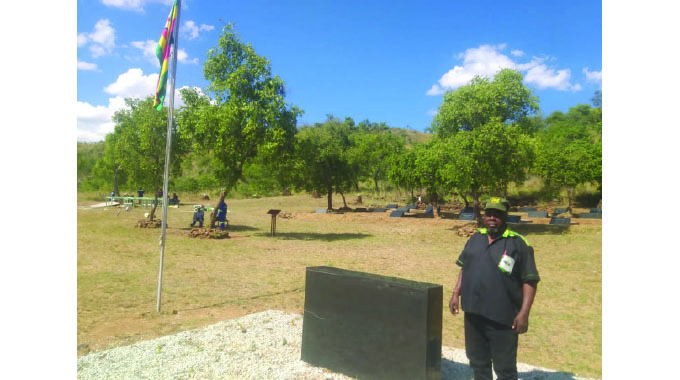‘Sino-Zim relations for mutual benefit’

China’s economic relations with Zimbabwe under the Look East Policy continue to grow. Our News Editor Lovemore Chikova (LC), who is in China, recently interviewed the heads of the Jiangsu Provincial Department of Commerce and the China Jiangsu International Economic and Technical Cooperation Group Ltd (CJI) on the state of their investments in Zimbabwe and what these corporates from the Asian giant think of Zimbabwe’s economic climate.
LC: China Jiangu province’s investment in Zimbabwe is in line with the African country’s Look East policy which has the main content of cooperating with China. What is your view of the policy?
Jiangsu Provincial Department of Commerce: Any country introduces its major policies according to its particular background and objectives and we will not comment on the policy itself. On December 4, 2015, President Xi Jinping addressed the opening ceremony of the Johannesburg summit on China-Africa Cooperation – “Open a New Era of China-Africa Win-Win Cooperation and Common Development”.
He said China and Africa share a common future. In the new era, we should carry forward the traditional China-Africa friendship and translate the strengths of our traditional friendship into driving forces to boost solidarity, cooperation and development. To build China-Africa’s comprehensive strategic and cooperative partnership, China will implement 10 cooperation plans with Africa in the next three years.
Guided by the principle of government guidance, businesses being the major actors, market operation and win-win cooperation, these plans aim at addressing three bottleneck issues holding back Africa’s development, namely inadequate infrastructure, lack of professional and skilled personnel and funding shortage, accelerating Africa’s industrialisation and agricultural modernisation and achieving sustainable self-development.
LC: How many major projects, and their value, has Jiangsu province invested in in Zimbabwe?
Jiangsu Provincial Department of Commerce: We will implement the instructions of President Xi and stick to the above mentioned principles to support Jiangsu enterprises’ endeavour to invest and develop in Africa. It is known that Jiangsu province has invested in five projects in Zimbabwe with the contracted investment standing at $44,21 million, among which four were carried out after 2011.
These projects involve the iron and steel metallurgy, agriculture and construction and installation, all going smoothly. We respect and understand the localisation policy of the Zimbabwean Government. We hope that Jiangsu’s business in Zimbabwe abides by the local laws and the vision of win-win progress is strengthened and the Zimbabwean Government protects the legitimate rights and interests of our enterprises in Zimbabwe.
LC: What measures should be taken to promote China-Africa cooperation and the cooperation between Jiangsu and Zimbabwe in particular?
Jiangsu Provincial Department of Commerce: In 2015, Jiangsu’s trade volume with Zimbabwe totalled $56,39 million, up by 18,4 percent from a year earlier. Of this total volume, $53,80 million was from Jiangsu’s exports to Zimbabwe, up by 72,8 percent, $2,59 million import, down by 84,3 percent.
Among our exports to Zimbabwe, machinery, mechanical appliances, electrical equipment and parts took the first place, accounting for 53,3 percent; base metal and its metal works as well as textile raw material and textile products ranked second and third, accounting for 12,1 percent and 11,7 percent respectively.
Among our imports from Zimbabwe, the most was minerals, accounting for 69,7 percent, textile raw materials and textile products ranked second, accounting for 26,7 percent; wood and wood products ranked third, accounting for 3,6 percent.
We welcome Zimbabwean business and investment promotion institutions to hold various promotion activities, including investment environment promotion seminars in Jiangsu. Meanwhile, we encourage our enterprises to carry out investment study activities in Zimbabwe. We will continue to serve and support Jiangsu enterprises in their endeavour to invest and develop African countries, including Zimbabwe.
LC: China Jiangsu International Economic and Technical Cooperation Group Ltd (CJI), a State firm from Jiangsu province, has engaged in many projects in Zimbabwe, including the expansion of Victoria Falls International Airport. What are some of the projects and their benefits?
CJI: CJI launched business in Zimbabwe in 1995 and only undertook contracted projects before 2012. After 2013, CJI undertook the expansion project of Victoria Falls International Airport with preferential loans provided by the Chinese government.
Currently, 97 percent of the total work has been completed, including the construction of runway, terminal, control tower, parking apron, light navigation, communication system and other facilities. On December 1, 2015, it was put into service by the Civil Aviation Authority of Zimbabwe and has been highly spoken of by all sectors of society in Zimbabwe.
CJI will continue to engage in the initiative of facilitating development of African express railway network, expressway network, regional aviation network and infrastructure industrialisation raised in cooperation strategies between China and African countries.
Guided by the principles of President Xi’s visit to Zimbabwe and the Johannesburg summit of the Forum on China-Africa Cooperation, we will increase input in the infrastructure of Zimbabwe and expand our cooperation and try to launch projects in the mode of BOT (Build Operate and Transfer) or PPP (Public-Private Partnership) when Zimbabwe faces financial problems.
CJI is making great efforts to advance the expansion project of Harare International Airport and it is in the phase of feasibility study report and initial design.
LC: What is the envisaged benefit of the expansion of Victoria Falls International Airport?
CJI: Expansion of Victoria Falls International Airport will greatly improve the equipment and facilities, as well as the capability of safeguarding civil aviation security. More international routes will be opened to make easy access to the world renowned Victoria Falls, the second largest waterfall in the world, from major cities around the globe.
After the expansion, reception of international tourists will be increased from 500 000 person-times to two million person-times. Wide body airplanes such as Boeing 747 and 767 and Airbus 340 and 380 will be able to take off or land on the newly-built airfield runway. The sharp increment in international tourists and foreign currency earnings will boost the tourism and the matching service industry in Victoria Falls.
The rapid development of tourism will also drive up the tertiary industry, including transportation, posts and telecommunications, real estate, business, insurance, culture and entertainment and will open up new markets for industry and construction to become hotspots of consumption.
The chances are good that in future new industry as a stable driver for economic growth will come into being for the sake of the sustainable development of Zimbabwe’s economy. The expansion on Victoria Falls International Airport brings jobs to local people, hones the skills of Zimbabwean technicians, teaches Chinese big time construction techniques and management to Zimbabwean counterparts, nurtures a group of talents locally and helps promote the construction industry in Zimbabwe.
In Zimbabwe or even Southern Africa, this airport will be regarded as a modern international airport, for all its technical and application dimensions have reached high standards of today’s international civil aviation services.
LC: Are there any challenges facing the expanded airport?
CJI: Currently, the expansion project is confronted with the following difficulties: high transport cost of imported cargo, slow and complicated customs clearance, cumbersome procedure of certification, slow approval of designing and construction drawings, shortage of local supply of major construction materials, cement, gravel and fuel oil in particular, frequent power and water failure and lack of qualified technical personnel. All the above are encumbering the quality and the progress of the expansion.
LC: How does CJI view the business and trade environment in Zimbabwe? Which areas need to be improved?
CJI: Zimbabwe used to be called the granary of Southern Africa for it is blessed with rich natural resources such as minerals (diamond, emerald, chromium, coal and uranium), flourishing forestry and vegetation, mild climate and breathtaking landscapes.
Citizens of Zimbabwe are well educated. It is a charming place and definitely will have a bright future. However, Zimbabwe has a statutory minimum wage higher than that in its neighbouring countries, so the labour cost is relatively high.
In addition, infrastructure in Zimbabwe is quite poor. The banking sector is greatly encumbered by localisation policy which leads to an extremely slow development of many sectors, including the manufacturing industry.
We believe that efforts need to be made to reform or improve the infrastructure, foreign investment environment and policy, labour laws and financial sector. And at the same time, the Zimbabwean Government shall strengthen, in a practical way, the inter-governmental communication with major investing countries and implement cooperation that truly reflect mutual benefit and win-win relations.







Comments